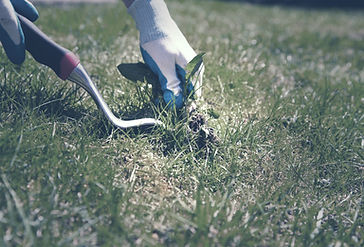Weed Control
What are weeds?
Put simply, a weed is just a plant in the wrong place! For example, we think of dandelions as a weed in a lawn, but grass becomes a weed in planted borders! If left unchecked, weeds can quickly take over a lawn, out-competing the grass, leaving it looking a mess.
Types of weeds
Some common weeds are Daisy, Thistle, Buttercup, Clover, Dandelion and Plantain. These are some of the easier weeds to control, typically requiring one pesticide application to see results.
The list of harder to control weeds is alot longer. These include Speedwell, Woodrush, Yarrow and Lesser Trefoil to name but a few. These can require more than one application of pesticide, usually of 2 different products to get satisfactory results.




Controlling Weeds
There are 2 ways of controlling weeds - manual removal or an application of a selective herbicide.
A first visit from us will usually require a blanket application of a suitable selective herbicide (where the whole lawn is sprayed). This is to get on top of the current weed growth, to then allow for either manual removal or spot spraying of any re-growth. This ensures our pesticide application volume is kept to a minimum for the good of the environment.
Not all Herbicides are suitable for every plant. Some plants respond better to different active ingredients so we choose the correct pesticide for the correct situation.
Weeds are difficult to completely control as there are so many factors in where they come from. The seeds can be blown in by wind, dropped by birds, or lying dormant in the soil itself until such time as it deems the conditions to be perfect. Controlling them is a continuous process.
We are PA1/PA6 City & Guilds / NPTC qualified for the purchase, storage, transport and use of Plant Protection Products.
We can safely recommend the correct pesticide for the correct application.
All our Pesticide products are pet and child safe once they have dried on the plant. Usually around 1hr after application in optimal conditions. We advise on this matter on the day of treatment. Grazing pets such as Rabbits, Guinea pigs, and Hens, should be kept off for a minimum of 2 weeks to allow the product to dissipate safely through the plant and soil.
Whilst you may get satisfactory results from a domestically available pesticide from your local DIY store, as professional, qualified technicians, we have access to a vast range of products which produce better results with less chemicals used.
